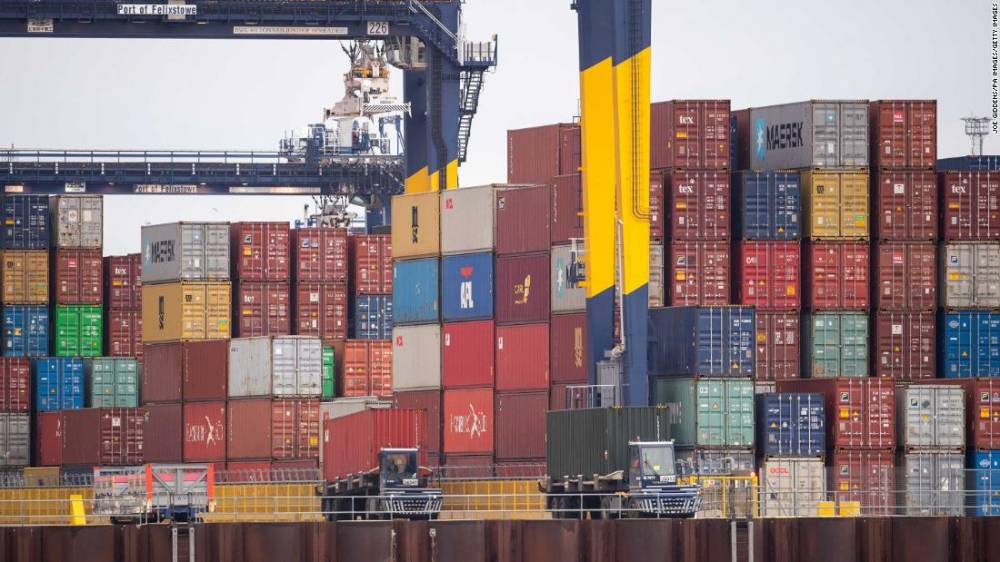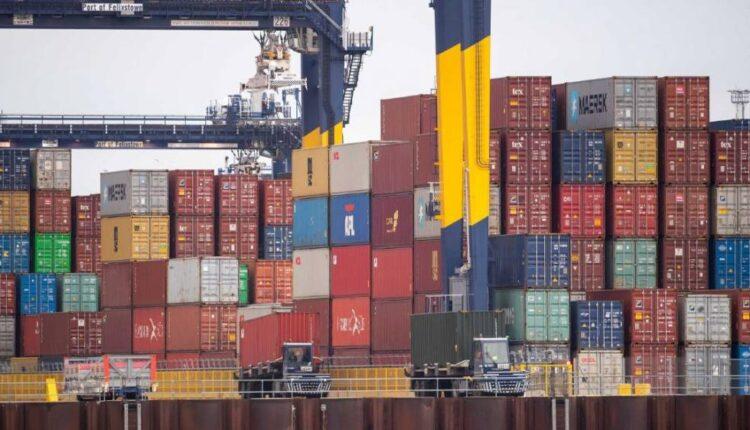London (CNN Business)UK ports are suffering from “significant disruption” that threatens to delay Christmas orders and push up the prices of goods even before Brexit hits, according to industry groups that warn companies are losing millions of pounds in sales.
The British Retail Consortium and the Food and Drink Federation on Thursday called for an urgent inquiry into delays at ports, including Felixstowe and Southampton. They said logjams are causing shipping costs to rise by as much as 25% a week.The port of Dover, which handles 17% of the United Kingdom’s goods trade, is also jammed up. CNN journalists witnessed trucks backed up for over 10 miles on the approach to Dover on Wednesday, with truckers reporting waits of multiple hours.
Delays in getting goods onto shelves are hurting sales at a crucial time of the year and will force retailers to increase the prices of products. One company has lost over £1 million ($1.4 million) in sales due to the delays, the groups said in a letter to the UK parliament.”The lead up to Christmas is the most important time of year for retailers; ordinarily accounting for up [to] a fifth of the entire year’s sales,” said British Retail Consortium CEO Helen Dickinson. “After a tremendously challenging 2020, many firms’ cash flows are under severe pressure, and so businesses are in no position to absorb these additional shipping costs,” she added.Read MoreSeveral British retailers have filed for bankruptcy this year, including the country’s biggest department store Debenhams, and more than 170,000 jobs in the industry have been lost, according to the Centre for Retail Research. UK ports are busier than usual because of a worldwide surge in container shipping demand, as companies restock inventories ahead of the holiday season following a slump in trade during coronavirus lockdowns. Home-bound consumers are also spending more on durable goods, many of which are sourced from Asia. Brexit is adding more pressure. After leaving the European Union earlier this year, the United Kingdom will lose its favorable trading status with the vast EU market on January 1, 2021, with new customs checks and paperwork expected to result in significant delays to shipments of goods at the border. Tariffs and quotas will pile on the pain if there’s no new UK-EU trade deal by then. “Once the Brexit transition period ends, UK ports will be placed under even greater pressure,” the British Retail Consortium and the Food and Drink Federation said in a statement.

Shipping containers are unloaded from a cargo ship at the Port of Felixstowe in Suffolk on December 13.
Shipping costs increase
The crunch in global supply chains has driven shipping costs to record levels, say analysts, with Covid-related restrictions, including social distancing measures and quarantine, only adding to the pressure on ports.The cost of shipping a container from China to the US west coast climbed 135% between the end of May and the middle of September before flattening, according to the Freightos Baltic Index.Europe-bound container spot rates have almost doubled in the past two weeks alone after increasing steadily since June, according to international shipping association BIMCO. “This market squeeze will only get solved slowly, as the wheels of global supply chains keep turning, but always at a steady pace,” BIMCO chief shipping analyst Peter Sand wrote in a research note on Wednesday. Meanwhile, the looming Brexit deadline is prompting UK companies to stockpile certain goods over fears that delays at border crossings and other hurdles will snarl supply chains that rely on precisely timed deliveries.Honda (HMC) was forced to halt production at a major plant in England for three days last week because of transport-related parts delays. Production resumed on Monday, according to the company, but the shutdown does not bode well for January.Swedish furniture retailer Ikea, meanwhile, apologized to customers on Monday for delays in deliveries and stock shortages linked to gridlock at UK ports.John Allen, the chairman of Britain’s biggest supermarket chain Tesco (TSCDF), told Bloomberg TV last week that the company has been stockpiling as much food as possible ahead of the Brexit deadline and warned that there could be shortages of fresh foods for a limited period.”Food and drink manufacturers are extremely concerned about the delays we are witnessing at the ports,” Food and Drink Federation chief operating officer Tim Rycroft said in a statement on Thursday. The disruption is impeding the ability of some firms to build up stockpiles and ingredients, he added. “Christmas orders could be delayed, and retailers might be left with no option but to increase product prices,” added Dickinson. “These issues must be addressed urgently.”
Helicopters may be needed
The port industry has pushed back. It says that the current issues are not unique to the United Kingdom and that ports are managing increased volumes. “The underlying issues are well understood and there is no case for significant intervention or change to government policy,” the British Ports Association said in a statement.UK Major Ports Group CEO Tim Morris said that the association is in close contact with the government and that there are no “magic wand solutions.”For some firms, helicopters might be a last resort. UK transport company Alcaline, which ships parts for car manufacturers such as Jaguar Land Rover, has invested in two helicopters in the past two years due to Brexit risks.It takes just 20 minutes to fly over the English Channel crossing between Dover and the French town of Calais, which is already becoming a major crunch point ahead of the January 1 deadline. The port of Dover handled 2.4 million trucks in 2019 and another 1.6 million passed through the nearby Eurotunnel under the Channel.Alcaline operations manager David Zaccheo told CNN Business on Wednesday that many of its customers have been stockpiling since September. “But in the last three weeks, we’ve experienced untold amounts of orders,” he added, saying that this was “purely stockpiling” and not pandemic related.
“At the moment, we’ve had to refuse so many loads… If it’s an emergency, though, we’ve got the helicopters.”— Anna Stewart contributed reporting.
Source: edition.cnn.com

